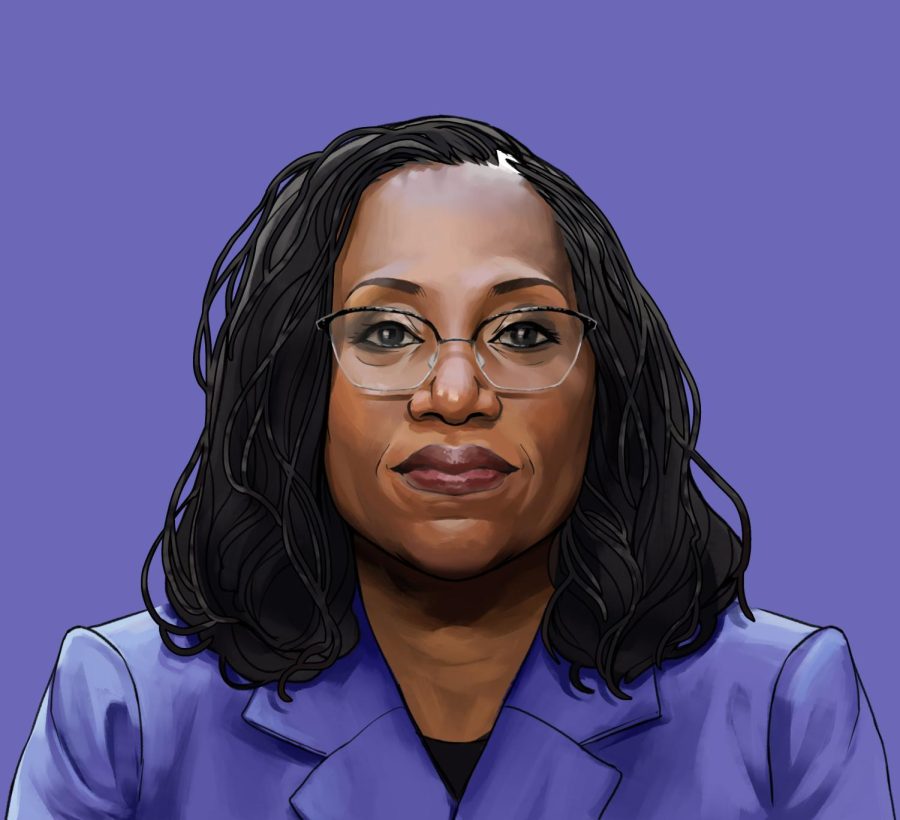Black Law and pre-law students reflect on Ketanji Brown Jackson confirmation as first Black female supreme court justice
April 22, 2022
Editor’s Note: This article first appeared in the April 19, 2022 flipbook.
Sitting in the breakroom at his internship for the U.S. House of Representatives, Jeremiah Baldwin said he felt emotional as he watched the first Black female vice president confirm the first Black female Supreme Court Justice on live TV.
On April 7, a senate vote of 53 to 47 confirmed Ketanji Brown Jackson as a Supreme Court Justice. The vote took place after the Senate Judiciary Committee confirmation hearings from March 21 through March 24. Jackson is the first Black female to be nominated and confirmed as a Supreme Court Justice in the court’s 233 years of existence.
“When I heard (Vice President Kamala Harris) say that (Jackson) is confirmed, I just felt so many aspects of my life being validated,” said Baldwin, an African and African diaspora studies, government, and rhetoric and writing junior. “As someone who wants to go into the legal field, it made me feel that this is what I should be doing, that my voice is going to be heard and listened to in the courtroom in the future.”
Baldwin is a part of UT’s Archer Fellowship Program, which allows students to take classes and intern in Washington D.C. Baldwin’s internship with the House Committee on Oversight and Reform gave him the opportunity to attend a confirmation hearing for Jackson on March 22.
For many Black students at UT hoping to go into law, Jackson’s confirmation served as an inspiration.
Desiree Jones is a third year UT Law student and president of Thurgood Marshall Legal Society, an affiliate with the National Black Law Students Association. Jones said Jackson’s confirmation felt like a victory, but she wished it happened sooner.
“It’s just now that (Black women) have been able to finally get recognition on the Supreme Court, it’s kind of just the epitome of Black women having to work twice as hard and be twice as smart as a white male or white woman to get in the same space” Jones said.
Jackson earned a degree from Harvard Law School and after graduating, she spent time as a public defender, a district judge, a court of appeals judge and supreme court clerk who worked on a sentencing commission. Jackson’s experience in different legal roles nearly doubles her fellow justices and she is now the only judge on the court with experience as a public defender, according to the Washington Post.
“The fact that she’s the first public defender to be on the highest court, my hope is that it’ll create more of a balance, because a lot of individuals on the Supreme Court tend to lean towards the government and the prosecutors,” said Michelle Juma, a third year law student and Thurgood Marshall Legal Society member.
Juma said seeing Jones “break the glass ceiling” for Black women in the field of law makes her feel like she is on cloud nine.
“It means everything to me,” Juma said. “Being a part of the two percent of the Black women that are going to be a part of the legal profession, seeing what she accomplished means more of us can accomplish the same thing.”
Tavia Wilson, a sociology and government sophomore on the pre-law track, said that Jackson wearing her hair in locks inspires her.
“Historically, locks have been seen as unprofessional, so to me, to see somebody that looks just like me and has my same hairstyle is so refreshing,” Wilson said. “It gives me hope that I also can do big things and despite the fact that people may be negative, I can still overcome it.”



